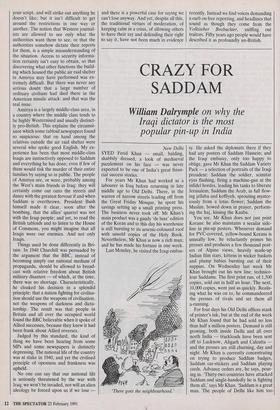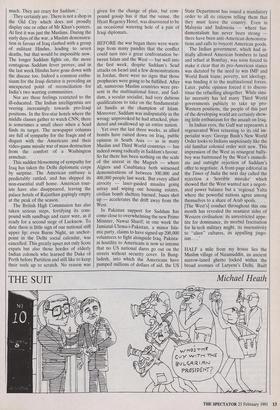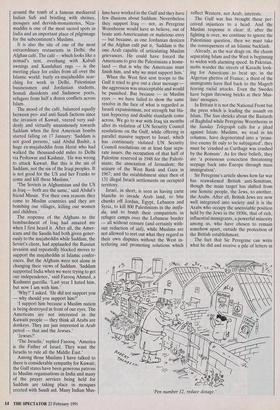CRAZY FOR SADDAM
William Dalrymple on why the
Iraqi dictator is the most popular pin-up in India
New Delhi SYED Ferid Khan — small, balding, shabbily dressed, a look of mediaeval puzzlement on his face — was never expected to be one of India's great finan- cial success stories.
For years Mr Khan had worked as a labourer in Iraq before returning in late middle age to Old Delhi. There, in the warren of narrow streets leading off from the Great Friday Mosque, he spent his savings setting up a small printing press. The business never took off. Mr Khan's main product was a gaudy `de luxe' edition of the Koran and to this day his warehouse is still bursting to its arsenic-coloured roof with unsold copies of the Holy Book. Nevertheless, Mr Khan is now a rich man; and he has made his fortune in one week.
Last Monday, he visited the Iraqi embas- 'There goes the neighbourhood.' sy. He asked the diplomats there if they had any posters of Saddam Hussein; and the Iraqi embassy, only too happy to oblige, gave Mr Khan the Saddam Variety Pack — a selection of portraits of the Iraqi president: Saddam the soldier, scimitar eyes flashing, firing a machine-gun at the infidel hordes, leading his tanks to liberate Jerusalem; Saddam the Arab, in full flow- ing jellaba and keffiyeh, sprouting myster- iously from a lotus flower; Saddam the Muslim, bowed down in prayer, perform- ing the haj, kissing the Kaaba.
You see, Mr Khan does_ not just print Korans: he also maintains a secular side- line in pin-up posters. Whenever demand for PVC-covered, yellow-bound Korans is unusally low, he reluctantly primes his presses and produces a few thousand post- ers of Alpine views, heavily made-up Indian film stars, kittens in wicker baskets and plump babies bursting out of their nappies. On Wednesday last week Mr Khan brought out his new line: technico- lour Saddams. The first print run, of 1,500 copies, sold out in half an hour. The next, 10,000 copies, went just as quickly. Realis- ing what he was on to, he commandeered the presses of rivals and set them all a-ninning.
For four days his Old Delhi offices stank of printer's ink; but at the end of the week Mr Khan found that he had sold no less than half a million posters. Demand is still growing, both inside Delhi and all over north India — truckloads have been sent off to Lucknow, Aligarh and Calcutta — and the presses are still churning, day and night. Mr Khan is currently concentrating on trying to produce Saddam badges, Saddam car-stickers and Saddam playing cards. Advance orders are, he says, pour- ing in. 'Thirty-two countries have attacked Saddam and single-handedly he is fighting them all,' says Mr Khan. 'Saddam is a great man. The people of Delhi like him too much. They are crazy for Saddam.'
They certainly are. There is not a shop in the Old City which does not proudly display one or other of Mr Khan's posters. At first it was just the Muslims. During the early days of the war, a Muslim demonstra- tion in favour of Iraq clashed with a group of militant Hindus, leading to seven deaths, but that would be impossible now. The longer Saddam fights on, the more contagious Saddam fever proves; and in the last week Hindus have gone down with the disease too. Indeed a common enthu- siasm for the Iraqi dictator is providing an unexpected point of reconciliation for India's two warring communities.
Nor are these feelings restricted to the ill-educated. The Indian intelligentsia are veering increasingly towards pro-Iraqi positions. In the five-star hotels where the middle classes gather to watch CNN, there is sometimes a small cheer when a Scud finds its target. The newspaper columns are full of sympathy for the Iraqis and of disgust with the Americans and their video-game missile war of mass destruction from the comfort of a Washington armchair.
This sudden blossoming of sympathy for Iraq has taken the Delhi diplomatic corps by surprise. The American embassy is predictably rattled, and has shipped its non-essential staff home. American tour- ists have also disappeared, leaving the palace hotels of Rajasthan gapingly empty at the peak of the season. The British High Commission has also taken serious steps, fortifying its com- pound with sandbags and razor wire, as if ready for a second siege of Lucknow. To date there is little sign of our national stiff upper lip: even Burns Night, an anchor- point in the Delhi social calendar, was cancelled. This greatly upset not only Scots expats but also those hordes of elderly Indian colonels who learned the Duke of Perth before Partition and still like to keep their reels up to scratch. No reason was given for the change of plan, but com- pound gossip has it that the venue, the Hyatt Regency Hotel, was discovered to be an occasional watering hole of a pair of Iraqi diplomats.
BEFORE the war began there were warn- ings from many pundits that the conflict could turn into a great confrontation be- tween Islam and the West — but well into the first week, despite Saddam's Scud attacks on Israel and a few demonstrations in Jordan, there were no signs that those prophecies were going to be fulfilled. After all, numerous Muslim countries were pre- sent in the multinational force, and Sad- dam, a secular socialist, had very dubious qualifications to take on the fundamental- ist Saudis as the champion of Islam. Moreover, Saddam was indisputably in the wrong: unprovoked he had attacked, plun- dered and swallowed up an entire nation.
Yet over the last three weeks, as allied bombs have rained down on Iraq, public opinion in South Asia — as in many Muslim and Third World countries has indeed swung radically in Saddam's favour. So far there has been nothing on the scale of the unrest in the Magreb — where Algiers and Casablanca both witnessed demonstrations of between 300,000 and 400,000 people last week. But every allied atrocity — laser-guided missiles going astray and wiping out housing estates, civilian bomb shelters burned, buses shot up — accelerates the drift away from the West.
In Pakistan support for Saddam has come close to overwhelming the new Prime Minister, Nawaz Sharif; in one week the Jamiatul-Ulema-i-Pakistan, a minor Isla- mic party, claims to have signed up 200,000 volunteers to fight alongside Iraq. Pakista- ni hostility to Americans is now so intense that no US national dares go out on the streets without security cover. In Bang- ladesh, into which the Americans have pumped millions of dollars of aid, the US State Department has issued a mandatory order to all its citizens telling them that they must leave the country. Even in Malaysia and Indonesia — where fun- damentalism has never been strong — there have been anti-American demonstra- tions and calls to boycott American goods.
The Indian government, which had in- itially allowed American bombers to land and refuel at Bombay, was soon forced to make it clear that its pro-American stance was dictated by the need to win IMF and World Bank loans; poverty, not ideology, was binding it to the multinational forces. Later, public opinion forced it to discon- tinue the refuelling altogether. While simi- lar necessity has led many Third World governments publicly to take up pro- Western positions, the people of this part of the developing world are certainly show- ing little enthusiasm for the assault on Iraq.
In Indian eyes, the Gulf war represents a regenerated West returning to its old im- perialist ways: George Bush's New World Order looks to Indians suspiciously like the old familiar colonial order writ new. This impression of the West as resurgent bully- boy was buttressed by the West's immedi- ate and outright rejection of Saddam's offer to negotiate. A front-page editorial in the Times of India the next day called the rejection a 'horrible mistake' which showed that the West wanted not a negoti- ated power balance but a 'regional Yalta where the powerful nations agree among themselves to a share of Arab spoils. . . . 'The West's] conduct throughout this one month has revealed the seamiest sides of Western civilisation: its unrestricted appe- tite for dominance, its morbid fascination for hi-tech military might, its insensitivity .to "alien" cultures, its appalling jingo- ism ....'
HALF a mile from my house lies the Muslim village of Nizamuddin, an ancient narrow-laned ghetto locked within the broad avenues of Lutyens's Delhi. Built around the tomb of a famous mediaeval Indian Sufi and bristling with shrines, mosques and dervish-monasteries, Niza- muddin is one of the most sacred spots in India and an important place of pilgrimage for the subcontinent's Muslims.
It is also the site of one of the most extraordinary restaurants in Delhi: the Afghan café. The café -- which looks like a nomad's tent, overhung with Kabuli awnings and Kandahari rugs — is the meeting place for exiles from all over the Islamic world: burly ex-mujaheddin sear- ching for work in Delhi, Palestinian businessmen and Jordanian students, Somali dissidents and Sudanese poets, refugees from half a dozen conflicts across Islam.
The mood of the café, balanced equally between pro- and anti-Saudi factions since the invasion of Kuwait, veered very sud- denly and virtually unanimously towards Saddam when the first American bombs started falling on 17 January: 'Saddam is not good persons,' said Abdul Bashir, a huge ex-mujaheddin from Herat who had walked the thousand-odd miles to Delhi via Peshawar and Kashmir. 'He was wrong to attack Kuwait. But this is the sin of Saddam, not the sin of the Iraqi peoples. It is not good for the US and her Franks to come and kill these Muslims.'
'The Soviets in Afghanistan and the US in Iraq — both are the same,' said Abdul's friend Musur. 'For their own reasons they come to Muslim countries and they are bombing our villages, killing our women and children.'
The response of the Afghans to the bombardment of Iraq had amazed me when I first heard it. After all, the Amer- icans and the Saudis had both given gener- ously to the mujaheddin while Saddam, the Soviet's client, had applauded the Russian invasion and repeatedly blocked moves to support the mujaheddin at Islamic confer- ences. But the Afghans were not alone in changing their views of Saddam. 'Saddam supported India when we were trying to get our independence,' said Farooq Ahmed, a Kashmiri guerilla. 'Last year I hated him, but now I am with him.'
'Why?' I asked. 'He did not support you — why should you support him?'
'I support him because a Muslim nation is being destroyed in front of our eyes. The Americans are not interested in the Kuwaiti people — they think all Arabs are donkeys. They are just interested in Arab petrol — that and the Jewses.'
`Jewses?'
'The Israelis,' replied Farooq. 'America is the Father of Israel. They want the Israelis to rule all the Middle East.'
Among those Muslims I have talked to there is considerable sympathy for Kuwait; the Gulf states have been generous patrons to Muslim organisations in India and many of the prayer services being held for Saddam are taking place in mosques erected with Saudi aid. Many Indian Mus- lims have worked in the Gulf and they have few illusions about Saddam. Nevertheless they support Iraq — not, as Peregrine Worsthorne would have us believe, out of brute anti-Americanism or malicious envy — but because, as one Jordanian denizen of the Afghan café put it, 'Saddam is the one Arab capable of articulating Muslim grievances. He could have forced the Americans to give the Palestinians a home- land — that is why the Americans must finish him, and why we must support him.'
When the West first sent troops to the Gulf it tried to give out a clear message — the aggression was unacceptable and would be punished. But because — in Muslim eyes — we have failed to show the same resolve in the face of what is regarded as Israeli expansionism, not strength but bla- tant hypocrisy and double standards come across. We go to war with Iraq six months after its violation of UN Security Council resolutions on the Gulf, while offering in parallel massive support to Israel, which has continously violated UN Security Council resolutions on at least four sepa- rate issues: the occupation of that half of Palestine reserved in 1948 for the Palesti- nians; the annexation of Jerusalem; the seizure of the West Bank and Gaza in 1967; and the establishment since then of 131 illegal Israeli settlements on occupied territory.
Israel, in short, is seen as having carte blanche to invade Arab land, to bite chunks off Jordan, Egypt, Lebanon and Syria, to kill 800 Palestinians in the indfa- da, and to bomb their compatriots in refugee camps over the Lebanese border — all without censure (and certainly with- out reduction of aid), while Muslims are not allowed to sort out what they regard as their own disputes without the West in- terfering and promoting solutions which reflect Western, not Arab, interests.
The Gulf war has brought these per- ceived injustices to a head. And the Muslim response is clear: if, after the fighting is over, we continue to ignore the Palestinian question, then we must take the consequences of an Islamic backlash.
Already, as the war drags on, the chasm separating Islam and the West is beginning to widen with alarming speed. In Pakistan, mobs wander the streets of Karachi look- ing for Americans to beat up; in the Algerian ghettos of France, a third of the immigrants have fled back to the Magreb fearing racial attacks. Even the Swedes have begun throwing bricks at their Mus- lims' mosques.
In Britain it is not the National Front but the press which is leading the assault on Islam. The Sun shrieks about the Bastards of Baghdad while Peregrine Worsthorne in the Sunday Telegraph calls for a jihad against Islam: Muslims, we read in his columns, have degenerated into a 'primi- tive enemy fit only to be subjugated', they must be 'crushed as Carthage was crushed by the Romans'. As for their beliefs, they are 'a poisonous concoction threatening seepage back into Europe through mass immigration'.
Sir Peregrine's article shows how far war has reawakened British anti-Semitism, though the main target has shifted from one Semitic people, the Jews, to another, the Arabs. After all, British Jews are now well integrated into society and it is the Arabs who occupy the unenviable position held by the Jews in the 1930s, that of rich, influential immigrants, a powerful minority among us, who have chosen to remain somehow apart, outside the protection of the British establishment.
The fact that Sir Peregrine can write what he did and receive a pile of letters in 'Pen number 12, reduce dosage.' support illustrates how far things have slipped. It is as if both sides — Western and Islamic — are now wilfully determined not to see and understand the views of the other. The long-term consequences of this are horrifying: perpetual conflict with Islam, a worldwide community numbering hundreds of millions of people across Asia, Africa and Europe — one fifth of man- kind. Already Americans are more or less unsafe in any country between Gibraltar and Jakarta; and while the rest of us, thank God, have yet to be tarred with the same brush, I for one feel a lot less secure when I wander the Saddam-festooned streets of Old Delhi; going to talk to Mr Khan last weekend I detected more hostility in the glances of passers-by than I have experi- enced ever before.
Meanwhile, all over the Muslim world the presses continue to roll out the posters of Saddam Hussein. In the time that it has taken you to read this article ten thousand more images of Saddam will have been placed in gunny bags and shipped off to distant Muslim villages in Sind or Kashmir or the Magreb. It's not what I should like on my wall, but each to his own. As Mr Khan put it, gazing at an image of his hero in full military uniform, medals glinting: 'No wonder the people like him. Saddam is so beautiful. Beautiful, beautiful.'





















































 Previous page
Previous page